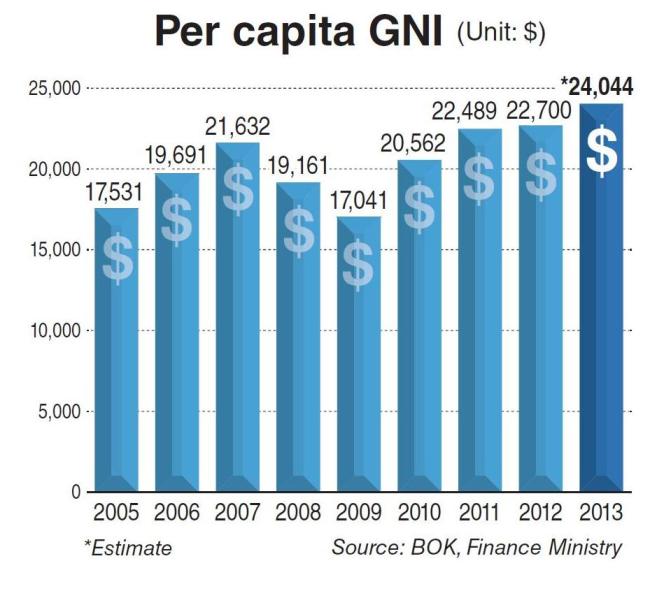
South Korea’s gross national income per capita is projected to set an all-time high of $24,044 (26.4 million won) this year on the back of the U.S. dollar’s cheaper position against the won.
After sliding to $17,041 in 2009 in the wake of the global financial crisis, the GNI per capita has continued to climb over the past few years ― $20,562 in 2010, $22,489 in 2011 and 22,700 in 2012.
Officials at the Bank of Korea said the estimate of record-high per capita income is mainly attributable to foreign exchange rates. The dollar stayed at 1,095 won on the average so far this year, compared with 1,102 won a year before.
They cite a weaker pace in the nation’s population growth as another major factor. Though the Korean population broke 50 million this year, its annual population growth rate stood at 0.43 percent.
The macro-economic research unit of KB Financial Group predicted that the GNI per capita would come to $30,000 in 2017. But the think tank said the growth rate in per capita income would fall behind for the next several years amid the projected slowdown in the nation’s GDP growth.
Meanwhile, the income gap between the haves and the have-nots widened this year, according to BOK statistics.
Disposable income held by the upper 20-percent bracket was 5.05-fold higher than the average figure held by the lower 20-percent bracket. It was 4.98-fold last year.
Further, the average debt held by the rich inched down to 137.21 million won, while the average debt held by an underprivileged household increased by 24.6 percent to 12.46 million won as of March.
According to a report by the Organization for Economic Cooperation and Development, Korea ranked 9th in income disparity in 2010 among the 34 OECD member countries.
In addition, the wage gap between college graduates without special capabilities and high-school graduate professionals has widened, sparking worries over the deepening gap in education levels.
BOK data showed that college graduates with no specialized skills had incomes 29 percent higher than high-school graduate professionals between 2010 and 2013.
The number marks a surge from the 13.9 percent gap tallied in 1993, implying the local job market still values educational background above other factors.
By Kim Yon-se
(kys@heraldcorp.com)





![[KH Explains] No more 'Michael' at Kakao Games](http://res.heraldm.com/phpwas/restmb_idxmake.php?idx=644&simg=/content/image/2024/04/28/20240428050183_0.jpg&u=20240428180321)













